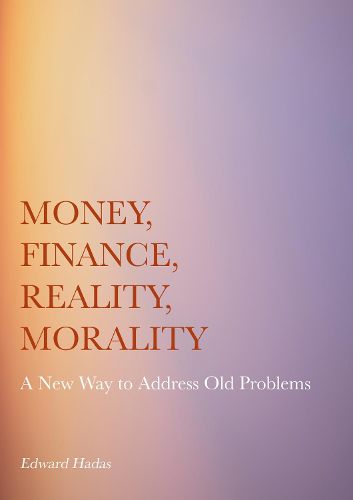Readings Newsletter
Become a Readings Member to make your shopping experience even easier.
Sign in or sign up for free!
You’re not far away from qualifying for FREE standard shipping within Australia
You’ve qualified for FREE standard shipping within Australia
The cart is loading…






This title is printed to order. This book may have been self-published. If so, we cannot guarantee the quality of the content. In the main most books will have gone through the editing process however some may not. We therefore suggest that you be aware of this before ordering this book. If in doubt check either the author or publisher’s details as we are unable to accept any returns unless they are faulty. Please contact us if you have any questions.
Conventional explanations of the nature of money are weighed down by bad ideas and irrelevant historical evidence. The standard theory of finance is hampered by the lack of both sociological and ethical contextualization, and by sloppy thinking about numbers and time. Money, Finance, Reality, Morality addresses those weaknesses with truly novel models of how the economy, money, and finance actually work. The book analyses the perception of money as an economic tool (as compared to a symbolic and sociological object) as a highly functional quantitative token that assigns numerical values to the inherently unmeasurable economic activities of labour and consumption. It looks at finance as an often inferior solution to economic problems and a tool for helping the poor support the rich. And it explains how the tolerance of greed makes the money-finance system the weakest link in modern economies. Money, Finance, Reality, Morality, written without jargon or maths, will be of interest to students, teachers and practitioners in economics and finance, government and politics, religion, philosophy, and sociology. Author: Edward Hadas is a Research Fellow at Blackfriars Hall, Oxford University (UK). He was formerly an economics editor and columnist for Reuters Breakingviews. He also worked on the Financial Times' influential Lex column, following 25 years as a financial analyst with firms such as Morgan Stanley and Putnam Investments.
$9.00 standard shipping within Australia
FREE standard shipping within Australia for orders over $100.00
Express & International shipping calculated at checkout
This title is printed to order. This book may have been self-published. If so, we cannot guarantee the quality of the content. In the main most books will have gone through the editing process however some may not. We therefore suggest that you be aware of this before ordering this book. If in doubt check either the author or publisher’s details as we are unable to accept any returns unless they are faulty. Please contact us if you have any questions.
Conventional explanations of the nature of money are weighed down by bad ideas and irrelevant historical evidence. The standard theory of finance is hampered by the lack of both sociological and ethical contextualization, and by sloppy thinking about numbers and time. Money, Finance, Reality, Morality addresses those weaknesses with truly novel models of how the economy, money, and finance actually work. The book analyses the perception of money as an economic tool (as compared to a symbolic and sociological object) as a highly functional quantitative token that assigns numerical values to the inherently unmeasurable economic activities of labour and consumption. It looks at finance as an often inferior solution to economic problems and a tool for helping the poor support the rich. And it explains how the tolerance of greed makes the money-finance system the weakest link in modern economies. Money, Finance, Reality, Morality, written without jargon or maths, will be of interest to students, teachers and practitioners in economics and finance, government and politics, religion, philosophy, and sociology. Author: Edward Hadas is a Research Fellow at Blackfriars Hall, Oxford University (UK). He was formerly an economics editor and columnist for Reuters Breakingviews. He also worked on the Financial Times' influential Lex column, following 25 years as a financial analyst with firms such as Morgan Stanley and Putnam Investments.